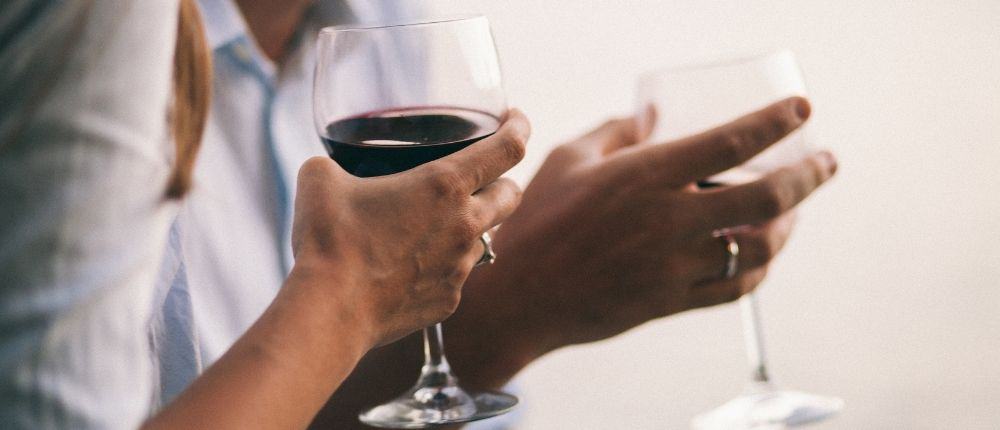
This website uses cookies to improve your experience. We'll assume you're ok with this, but you can opt-out if you wish. Read More
The Next Round: What happens after you change your drinking?


My challenge is to stay dry for the next few months at least. Last year I managed to stop for nearly two months and felt so much better in myself. Since then I’ve drank wine nearly every night – one bottle, sometimes more. It will be hard because my husband drinks wine too. I feel like I’m not getting the emotional support I need from my partner. Any advice? Jane

I’m not sure that we mean for it to happen, but for many couples, drinking wine together can become the cornerstone of our relationship. Wine, in particular, is a drink that’s designed for sharing. In lots of romantic relationships, sharing a bottle of wine together is part and parcel of dating, going out for a meal (remember that?) and unwinding at the end of the day. Whether we’re planning dinner menus, buying each other gifts or taking trips to vineyards, wine can easily become a shared passion.
But what if drinking wine becomes a shared problem? It can be disconcerting to realise how much of your relationship centres on drinking together. I’m sure there are other connective strands in your relationship. But if you are drinking every night with your partner, and then you decide to stop drinking, it’s going to feel like something big has changed. That’s a challenge for you because you feel like you are getting no emotional support from your partner. But it’s a challenge for your husband too because he’s missing a way for the two of you to spend time together.
Navigating this type of change in a relationship is difficult, but it is possible. There are many people in relationships in the Club Soda community who have worked out how to change their drinking, and changed their relationships too.
In my work running Club Soda’s courses, I’m privileged to talk to people who are making big life transitions. Of course, there are people on our courses who want to fine-tune their drinking habits. But there are others for whom changing their drinking is part of a bigger re-evaluation of life. What starts as the desire to cut down or take a break can turn into a major rethink, as they begin to see the role alcohol was playing in their life.
For those people who are in relationships and make this transition work for them, I hear one thing repeatedly. They ask for emotional support from their partner. This isn’t necessarily about having big heart-to-heart talks. But they are honest about what they are trying to achieve, and they talk to their partner about what is going on for them. Critically too, they don’t make demands of their partner to change their drinking. Sometimes, they need to be honest that their partners’ drinking bothers them. They might ask their partner to stop buying them alcohol as a gift. They may find alcohol-free drinks that they can share with their partner. But they keep lines of communication open.
A new relationship is the first blank page of an unwritten book. Expect plot twists and surprise reveals.
Some relationships are more accommodating of change than others. Some of us think our partner will always be the person they were when we got together, and we find change disconcerting. For others of us, a new relationship is the first blank page of an unwritten book. We expect plot twists and surprise reveals. If you’re finding that you get little or no emotional support from your partner, might it simply be because they find change difficult to handle?
Difficult as it is when you need emotional support, you can offer your partner reassurance. This doesn’t mean you have to drink when they drink. But just because you’re changing your drinking, it doesn’t mean you have to spend time apart. The bonds of your relationship are forged by both of you, not just by him.
If we’re honest, sometimes we can use our partner’s resistance as a reason not to change. It can be easier to keep drinking than to rock the boat, and we can end up blaming our partner for our problems. But a review conducted last year by researcher Lydia Muyingo points to an interesting way in which heterosexual couples influence each others’ drinking. There is evidence that when one member of a couple increases their drinking, so their other half will drink more, but the opposite is true too. Allowing for some time lag, if one partner drinks less, so on average will the other. And, critically the research found, “women had a larger effect on men than vice versa”.
This is not to put responsibility for your husband’s drinking on you. He’s a grown man who makes his own decisions, and together you’ve created the space for alcohol to take centre stage in your relationship. The good news is that if you change, you can begin to change the dynamics of your life together.
Nobody can promise you that this will work out, and your husband may never change. But don’t let that stop you changing anyway. You could be leading the way to a better relationship for both of you.
Cheers

Dru Jaeger is one of Club Soda’s co-founders and the author of How to Be a Mindful Drinker. He is a writer, researcher and coach, and leads all of Club Soda’s courses for people who want to change their drinking.
This website uses cookies to improve your experience. We'll assume you're ok with this, but you can opt-out if you wish. Read More
| Name | Domain | Purpose | Expiry | Type |
|---|---|---|---|---|
| wpl_user_preference | joinclubsoda.com | WP GDPR Cookie Consent Preferences. | 1 year | HTTP |
| PHPSESSID | www.tickettailor.com | PHP generic session cookie. | 55 years | HTTP |
| AWSALB | www.tickettailor.com | Amazon Web Services Load Balancer cookie. | 7 days | HTTP |
| YSC | youtube.com | YouTube session cookie. | 55 years | HTTP |
| Name | Domain | Purpose | Expiry | Type |
|---|---|---|---|---|
| VISITOR_INFO1_LIVE | youtube.com | YouTube cookie. | 6 months | HTTP |
| Name | Domain | Purpose | Expiry | Type |
|---|---|---|---|---|
| _ga | joinclubsoda.com | Google Universal Analytics long-time unique user tracking identifier. | 2 years | HTTP |
| sbjs_migrations | joinclubsoda.com | Sourcebuster tracking cookie | 55 years | HTTP |
| sbjs_current_add | joinclubsoda.com | Sourcebuster tracking cookie | 55 years | HTTP |
| sbjs_first_add | joinclubsoda.com | Sourcebuster tracking cookie | 55 years | HTTP |
| sbjs_current | joinclubsoda.com | Sourcebuster tracking cookie | 55 years | HTTP |
| sbjs_first | joinclubsoda.com | Sourcebuster tracking cookie | 55 years | HTTP |
| sbjs_udata | joinclubsoda.com | Sourcebuster tracking cookie | 55 years | HTTP |
| sbjs_session | joinclubsoda.com | SourceBuster Tracking session | Session | HTTP |
| Name | Domain | Purpose | Expiry | Type |
|---|---|---|---|---|
| mailchimp_landing_site | joinclubsoda.com | Mailchimp functional cookie | 28 days | HTTP |
| __cf_bm | tickettailor.com | Generic CloudFlare functional cookie. | Session | HTTP |
| NID | google.com | Google unique id for preferences. | 6 months | HTTP |
| Name | Domain | Purpose | Expiry | Type |
|---|---|---|---|---|
| _ga_10XZMT03ZM | joinclubsoda.com | --- | 2 years | --- |
| AWSALBCORS | www.tickettailor.com | --- | 7 days | --- |
| cf_clearance | tickettailor.com | --- | 1 year | --- |
| VISITOR_PRIVACY_METADATA | youtube.com | --- | 6 months | --- |
Join Club Soda for 10% off your first order of drinks for UK delivery. Plus get our latest news and special offers for members to choose better drinks, change your drinking and connect with others.
If you get an error message with this form, you can also sign up at eepurl.com/dl5hPn